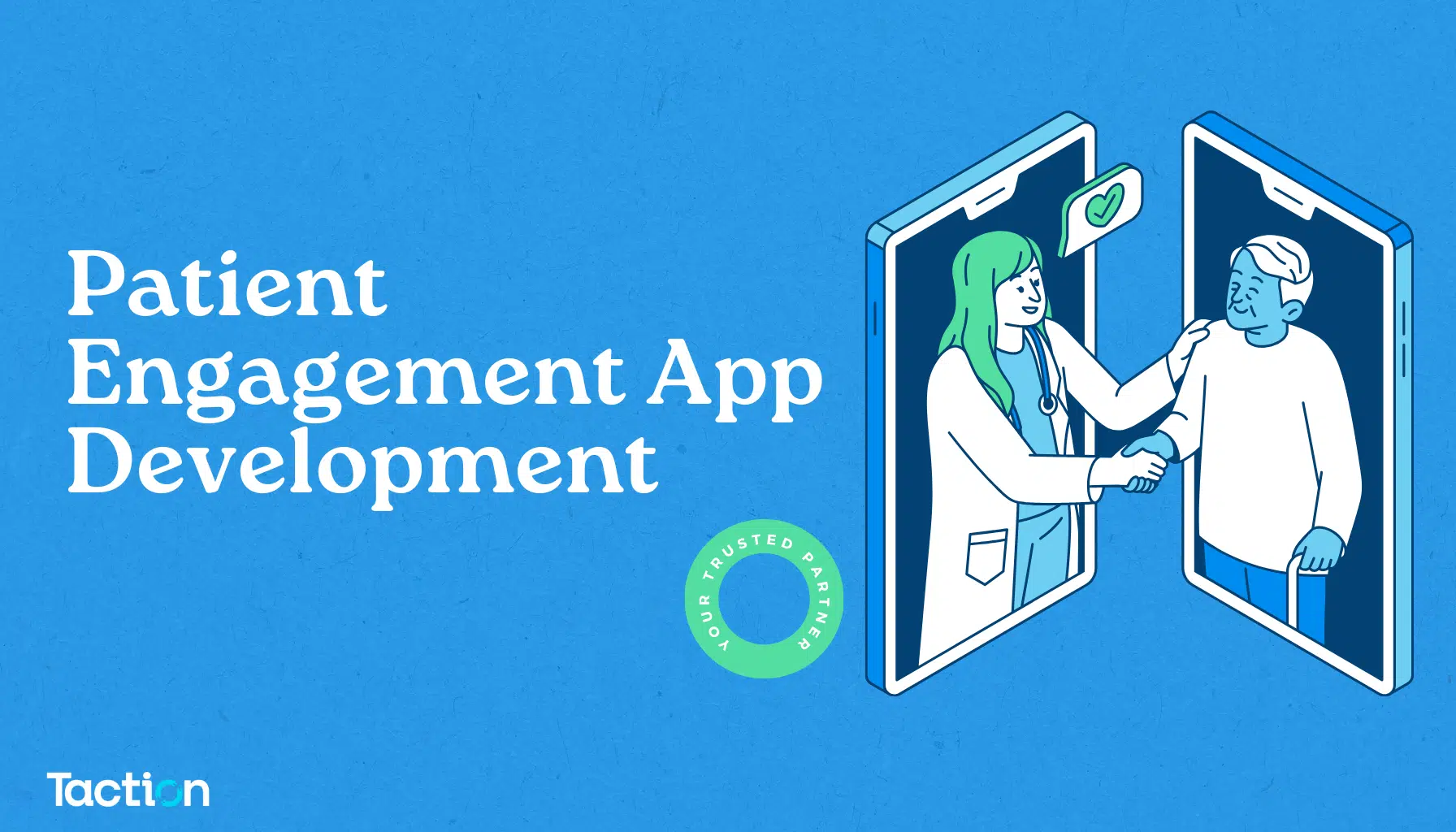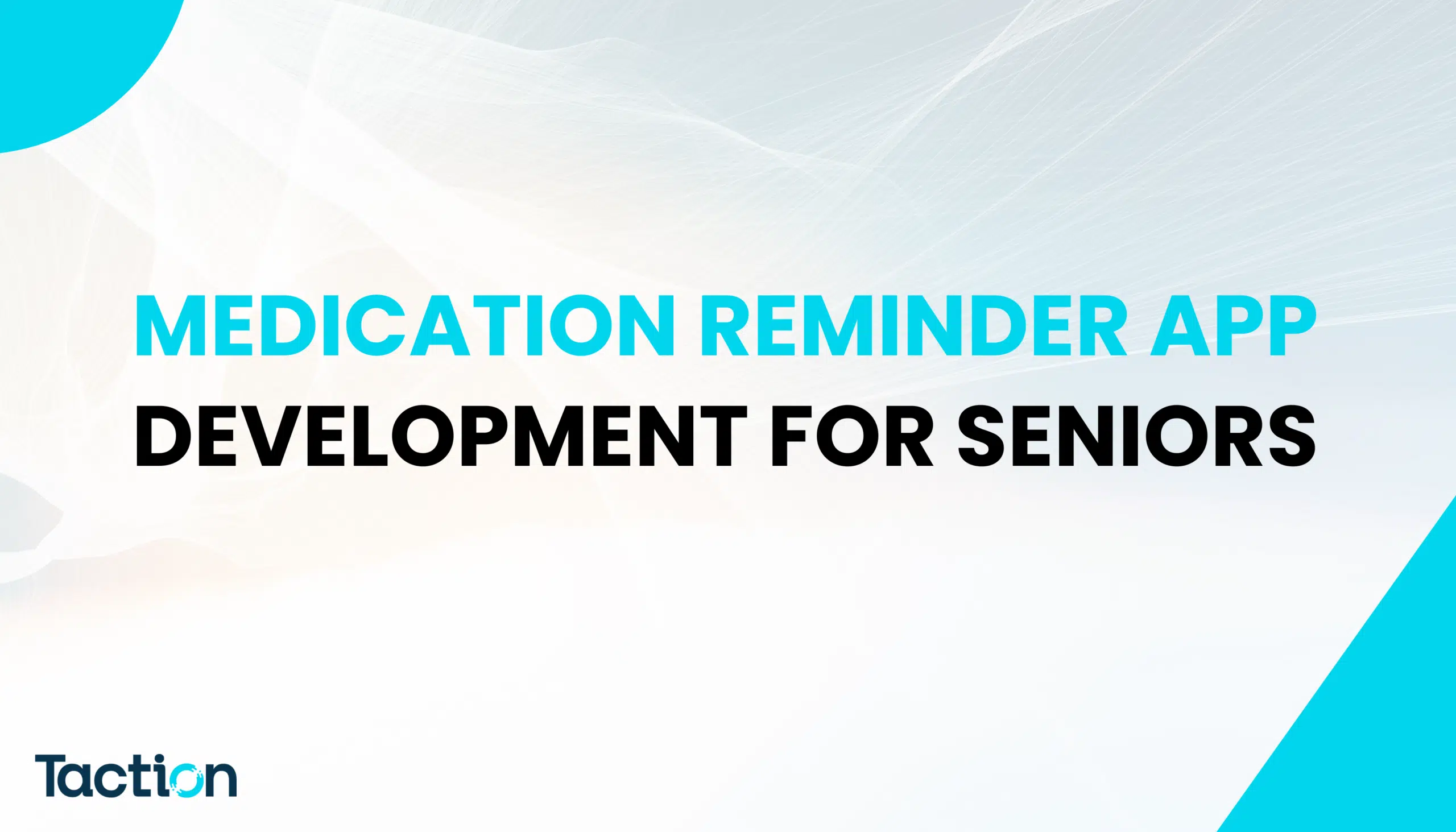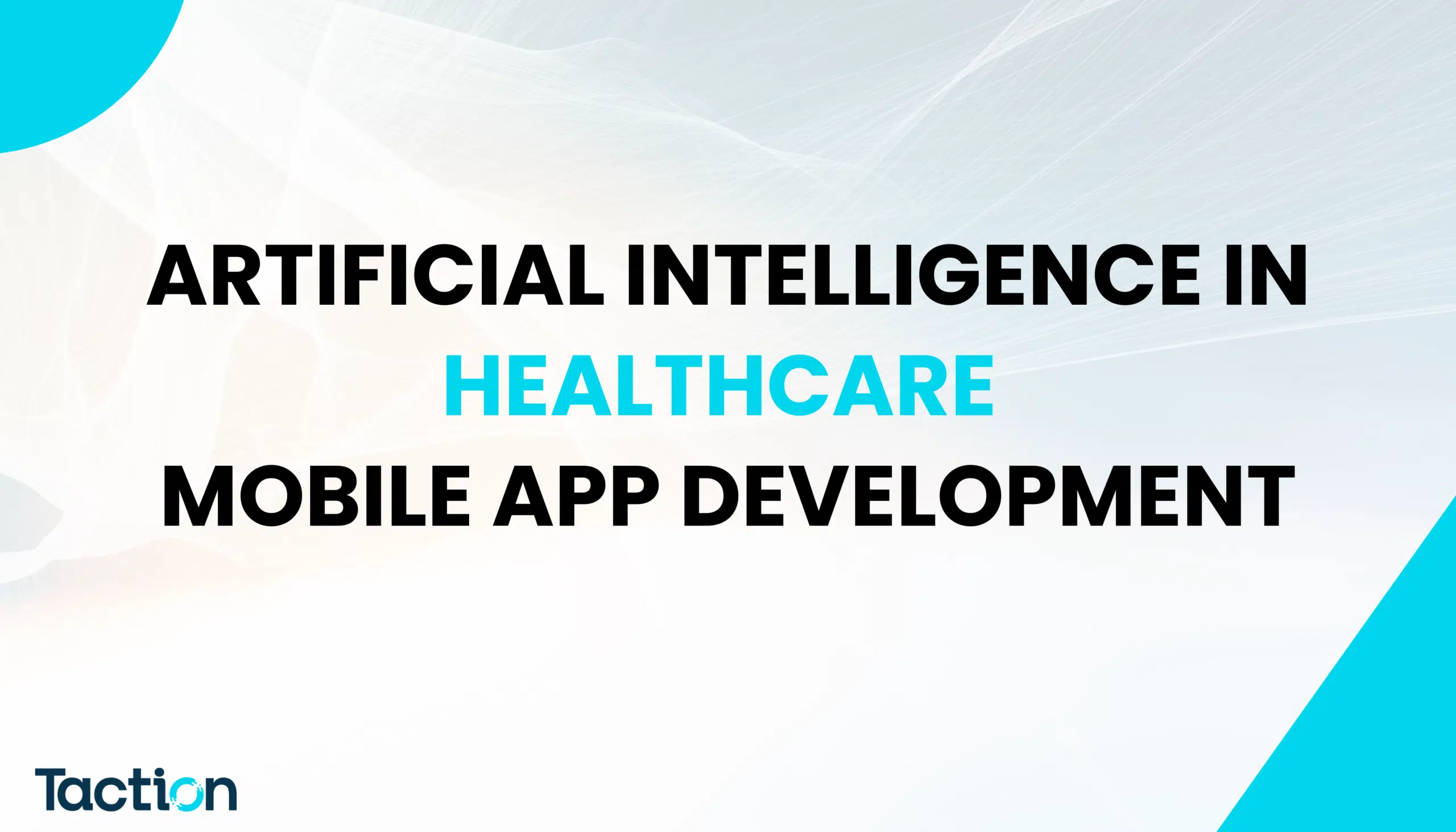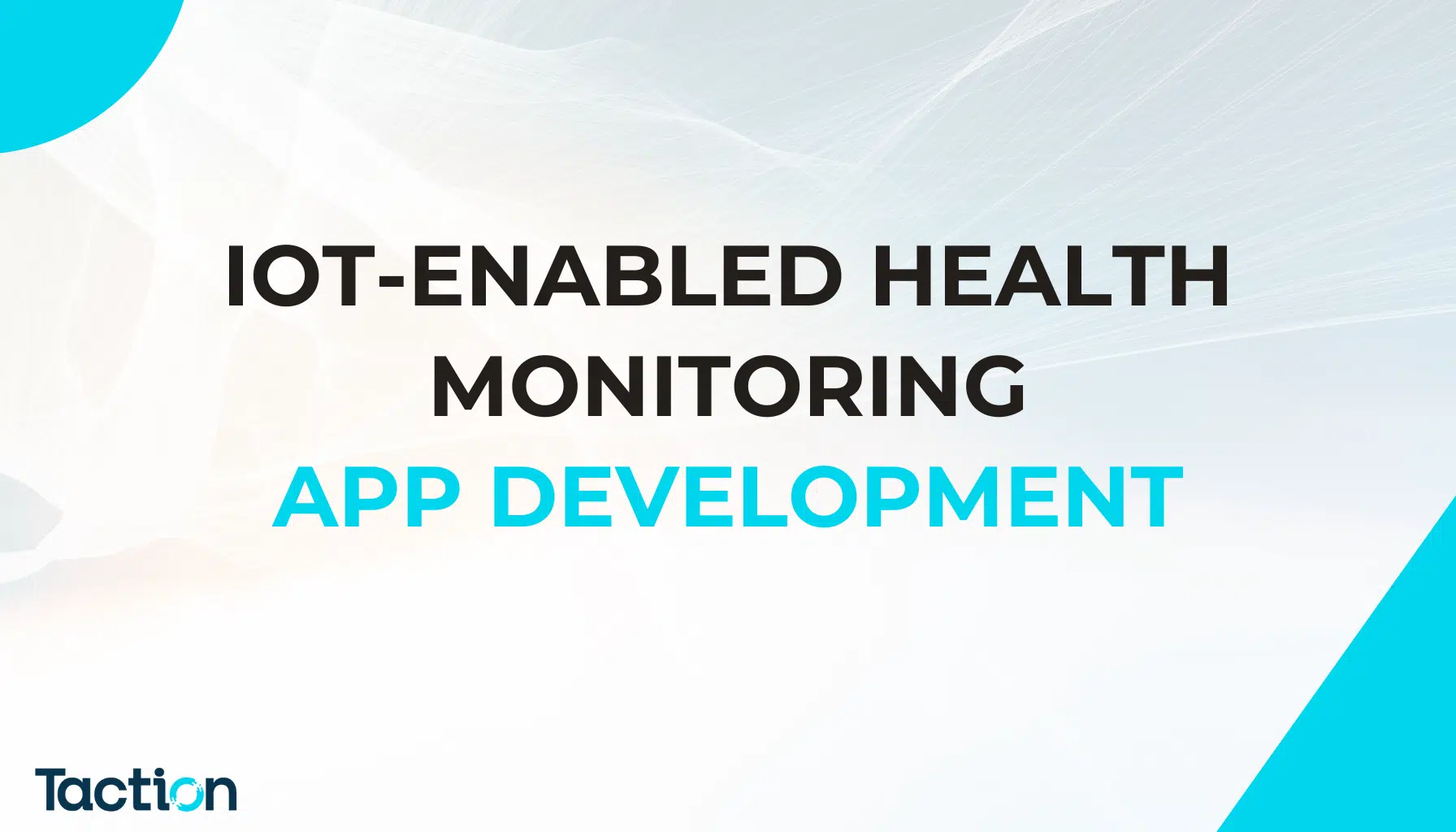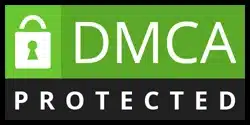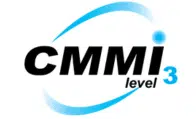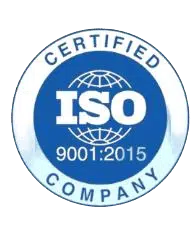Patient engagement app development company for US
In today’s rapidly evolving healthcare landscape, patient engagement is more than just a buzzword—it’s a necessity. Engaged patients are empowered patients, actively participating in their own healthcare journeys, leading to better outcomes, improved satisfaction, and reduced costs for providers. Modern healthcare systems are moving beyond traditional interactions, leveraging digital technologies to foster stronger relationships between patients and providers. This shift not only enhances the quality of care but also aligns with the broader goals of value-based care.
At the forefront of this transformation is Taction Software, a trusted name in patient engagement app development for US-based healthcare providers. With years of experience and deep expertise in healthcare technology, we design innovative, user-friendly solutions tailored to meet the unique needs of providers and patients. Our apps are built to bridge communication gaps, streamline processes, and empower patients with tools like appointment scheduling, secure messaging, remote monitoring, and personalized health education. Recognized for its commitment to compliance with regulations like HIPAA and interoperability standards such as FHIR, Taction Software is redefining how healthcare providers engage with their patients. Together, we’re not just building apps; we’re building the future of patient care.
Understanding the Role of Patient Engagement in Modern Healthcare
Patient engagement has become a cornerstone of effective healthcare delivery in the modern era. It represents the collaboration between healthcare providers and patients to foster informed decision-making, active participation, and a stronger commitment to achieving better health outcomes. By placing patients at the center of care, engagement initiatives drive a more personalized and efficient approach to healthcare, benefiting both providers and patients alike.
Why Patient Engagement is Crucial for Better Health Outcomes
Effective patient engagement directly influences treatment adherence, preventive care, and overall satisfaction. When patients are actively involved in their healthcare, they are more likely to adhere to prescribed treatments, attend follow-up appointments, and embrace preventive measures like routine screenings and vaccinations. This leads to improved disease management, early detection of health issues, and reduced hospital readmissions.
Moreover, engaged patients report higher levels of satisfaction, as they feel empowered to make informed decisions about their care. They benefit from improved communication with providers, access to educational resources, and tools that simplify the healthcare experience. This not only enhances the patient’s quality of life but also drives positive outcomes for healthcare organizations by fostering loyalty and reducing administrative burdens.
Patient Engagement Trends in the US Healthcare Industry
In the US, healthcare is evolving rapidly, with patient engagement being a key driver of innovation. Value-based care models, which prioritize outcomes over services provided, are placing patient engagement at the forefront. Digital health platforms are enabling seamless access to care, offering features like remote patient monitoring, secure messaging, and health tracking.
Telehealth has also emerged as a significant trend, providing patients with virtual consultations and continuous access to their providers. Additionally, the integration of wearable devices and mobile health apps is enhancing the way patients monitor their health and interact with their care teams. These trends underscore the growing importance of technology in transforming patient engagement and achieving better healthcare outcomes.
Build trust with HIPAA-compliant apps! Contact us today to ensure security and compliance.
Understanding the Role of Patient Engagement in Modern Healthcare
Patient engagement has become a cornerstone of effective healthcare delivery in the modern era. It represents the collaboration between healthcare providers and patients to foster informed decision-making, active participation, and a stronger commitment to achieving better health outcomes. By placing patients at the center of care, engagement initiatives drive a more personalized and efficient approach to healthcare, benefiting both providers and patients alike.
Why Patient Engagement is Crucial for Better Health Outcomes
Effective patient engagement directly influences treatment adherence, preventive care, and overall satisfaction. When patients are actively involved in their healthcare, they are more likely to adhere to prescribed treatments, attend follow-up appointments, and embrace preventive measures like routine screenings and vaccinations. This leads to improved disease management, early detection of health issues, and reduced hospital readmissions.
Moreover, engaged patients report higher levels of satisfaction, as they feel empowered to make informed decisions about their care. They benefit from improved communication with providers, access to educational resources, and tools that simplify the healthcare experience. This not only enhances the patient’s quality of life but also drives positive outcomes for healthcare organizations by fostering loyalty and reducing administrative burdens.
Patient Engagement Trends in the US Healthcare Industry
In the US, healthcare is evolving rapidly, with patient engagement being a key driver of innovation. Value-based care models, which prioritize outcomes over services provided, are placing patient engagement at the forefront. Digital health platforms are enabling seamless access to care, offering features like remote patient monitoring, secure messaging, and health tracking.
Telehealth has also emerged as a significant trend, providing patients with virtual consultations and continuous access to their providers. Additionally, the integration of wearable devices and mobile health apps is enhancing the way patients monitor their health and interact with their care teams. These trends underscore the growing importance of technology in transforming patient engagement and achieving better healthcare outcomes.
Key Features of an Effective Patient Engagement App
An effective patient engagement app serves as a bridge between healthcare providers and patients, streamlining interactions and fostering active participation in healthcare. By offering a range of intuitive features, these apps empower patients to take control of their health while improving operational efficiency for providers. Here’s a closer look at the essential features that make these apps indispensable.
Appointment Scheduling and Reminders
One of the core functionalities of a patient engagement app is its ability to automate appointment scheduling. This feature eliminates the need for manual intervention, allowing patients to book, reschedule, or cancel appointments with ease. Automated reminders via SMS, email, or app notifications ensure that patients don’t miss critical appointments, reducing no-shows and optimizing provider schedules. By offering a seamless scheduling experience, both patients and providers benefit from enhanced efficiency and satisfaction.
Secure Messaging and Communication
Effective communication is vital for patient engagement, and secure messaging ensures that patients can easily connect with their healthcare providers. HIPAA-compliant chat features enable patients to ask questions, share concerns, and receive timely responses without compromising data security. This real-time communication fosters trust and strengthens the patient-provider relationship, leading to better care coordination and outcomes.
Health Education and Resources
Personalized health education is another cornerstone of a robust patient engagement app. These apps provide patients with access to curated resources, such as articles, videos, and infographics, tailored to their specific conditions or health goals. This empowers patients to make informed decisions about their health, enhancing their ability to manage chronic conditions or adopt preventive care practices effectively.
Remote Patient Monitoring (RPM)
With the rise of wearable technology, integrating remote patient monitoring into engagement apps has become a game-changer. RPM allows healthcare providers to track patients’ vitals, such as heart rate, blood pressure, or glucose levels, in real time. This continuous monitoring enables early detection of potential health issues, timely interventions, and better chronic disease management, all while improving patient convenience and reducing hospital visits.
Patient Feedback and Surveys
Patient feedback is invaluable for improving healthcare services. Engagement apps can include survey and feedback tools to gather insights directly from patients about their experiences. This data helps healthcare providers identify areas for improvement, tailor services to patient needs, and maintain a high standard of care. Engaging patients in this way demonstrates a commitment to their satisfaction and fosters long-term loyalty.
By incorporating these features, a patient engagement app not only enhances the healthcare experience but also ensures better health outcomes and streamlined operations for providers.
Empower your patients with secure healthcare apps! Reach out now to learn more.
The Technology Behind Patient Engagement Apps
The success of patient engagement apps lies in the innovative technologies that power them. These apps are designed to seamlessly integrate into the healthcare ecosystem, ensuring efficiency, security, and personalized care. Here are the key technologies that form the backbone of effective patient engagement solutions.
Integration with EHR/EMR Systems
One of the most critical aspects of patient engagement apps is their integration with Electronic Health Records (EHR) and Electronic Medical Records (EMR) systems. This integration ensures a seamless exchange of patient data between the app and healthcare providers. By having real-time access to medical histories, test results, and treatment plans, providers can deliver personalized and efficient care. For patients, this means access to their records at their fingertips, empowering them to make informed decisions about their health. Such seamless data exchange eliminates redundancies, enhances care coordination, and boosts the overall healthcare experience.
AI and Machine Learning for Personalized Care
Artificial intelligence (AI) and machine learning (ML) technologies play a significant role in making patient engagement apps smarter and more effective. AI enables features like predictive analytics, which can identify health risks based on patient data, and virtual health assistants that provide personalized recommendations. Machine learning models analyze patient behavior and preferences to deliver tailored health insights, improving engagement and outcomes. For instance, AI-driven chatbots can address patient queries 24/7, enhancing interaction and reducing the burden on healthcare staff.
Cloud Technology for Data Security and Scalability
Cloud technology is at the core of patient engagement apps, providing secure and scalable infrastructure. Cloud-based solutions ensure that patient data is encrypted and stored safely, adhering to regulations like HIPAA. Additionally, the scalability of cloud technology allows apps to handle increasing user demands without compromising performance. This flexibility makes it easier for healthcare providers to adopt and expand digital solutions as their patient base grows.
Interoperability with Other Healthcare Systems
Interoperability is essential for creating a connected healthcare ecosystem, and patient engagement apps achieve this through FHIR (Fast Healthcare Interoperability Resources) standards and APIs. These technologies enable seamless communication between the app and various healthcare systems, such as laboratories, pharmacies, and diagnostic tools. Interoperability not only improves care coordination but also ensures that patients and providers have access to accurate and up-to-date information across all touchpoints.
By leveraging these advanced technologies, patient engagement apps empower providers and patients alike, ensuring a more connected, secure, and personalized healthcare experience.
Benefits of Patient Engagement Apps for Healthcare Providers
Patient engagement apps are transforming the way healthcare providers interact with patients, offering significant advantages that go beyond just improving care. By fostering better communication, automating processes, and providing actionable insights, these apps are helping providers streamline their operations and deliver higher-quality care. Here are some of the key benefits for healthcare providers:
Improved Patient Retention and Satisfaction
Patient engagement apps play a vital role in improving patient loyalty and satisfaction. By offering convenient features like appointment scheduling, reminders, and secure communication, these apps ensure a seamless healthcare experience for patients. When patients feel heard and supported, they are more likely to remain loyal to their healthcare providers. Additionally, personalized health insights and educational resources empower patients to take control of their health, fostering a sense of trust and satisfaction. This not only enhances patient retention but also generates positive reviews and referrals, further strengthening a provider’s reputation.
Streamlined Administrative Processes
One of the most significant benefits of patient engagement apps is their ability to automate administrative tasks. Features like online appointment booking, digital check-ins, and automated reminders reduce the burden on administrative staff, freeing up time for more critical tasks. Secure messaging tools eliminate the need for time-consuming phone calls, while electronic forms and digital records simplify documentation. By automating these processes, providers can improve operational efficiency, reduce costs, and allocate resources more effectively, ultimately leading to better care delivery.
Data-Driven Decision Making
Patient engagement apps provide healthcare providers with valuable data insights that can drive better decision-making. By collecting and analyzing data on patient behaviors, treatment adherence, and health outcomes, these apps enable providers to identify trends and areas for improvement. For example, analytics can reveal patterns in missed appointments, allowing providers to implement targeted interventions. Additionally, remote patient monitoring data can alert providers to potential health issues before they escalate, enabling timely and proactive care. With these insights, providers can optimize care strategies, improve patient outcomes, and enhance the overall efficiency of their practice.
By leveraging these benefits, healthcare providers can not only enhance patient care but also build stronger, more efficient, and patient-centered practices, positioning themselves as leaders in modern healthcare.
Transform healthcare with HIPAA-compliant solutions! Let’s collaborate today.
Benefits of Patient Engagement Apps for Patients
Patient engagement apps are revolutionizing the way individuals interact with their healthcare providers, making it easier for patients to stay informed, proactive, and in control of their health. These apps offer numerous benefits that enhance the patient experience while empowering them to prioritize their well-being. Here’s a closer look at how these apps improve patients’ lives:
Empowering Patients to Take Control of Their Health
Patient engagement apps give individuals the tools they need to actively participate in their healthcare journey. Through features like health trackers, medication reminders, and access to educational resources, patients can manage chronic conditions, monitor progress, and follow treatment plans more effectively. These apps enable users to set health goals, track milestones, and gain a better understanding of their conditions, fostering a sense of empowerment and accountability. By making patients co-managers of their healthcare, these apps help improve adherence to treatment and overall health outcomes.
Convenience and Accessibility
Gone are the days of long waits on the phone to book appointments or access health records. Patient engagement apps offer the convenience of on-the-go access to healthcare services. Patients can schedule appointments, view test results, and communicate with providers anytime, anywhere. This accessibility is especially valuable for individuals with mobility challenges, busy schedules, or those living in remote areas. Additionally, telehealth integration allows patients to consult with doctors virtually, reducing the need for in-person visits and ensuring timely care.
Personalized Health Insights
One of the standout benefits of patient engagement apps is their ability to provide personalized health insights. By analyzing patient data and preferences, these apps deliver tailored recommendations, such as lifestyle changes, diet plans, or preventive measures. This personalized approach helps patients make informed decisions about their health, enhancing their confidence and motivation to stay on track. Furthermore, apps that integrate with wearable devices offer real-time feedback on metrics like heart rate, sleep patterns, or activity levels, giving patients a comprehensive view of their health.
By improving access, providing valuable insights, and empowering individuals to take charge of their well-being, patient engagement apps are reshaping the healthcare experience for patients, making it more inclusive, efficient, and user-centric.
Challenges in Patient Engagement App Development and How We Overcome Them
Developing patient engagement apps comes with its own set of challenges, ranging from ensuring compliance with stringent regulations to creating an intuitive user experience. These hurdles require innovative solutions to deliver apps that are secure, user-friendly, and interoperable within the complex healthcare ecosystem. Here’s how these challenges are addressed effectively:
Ensuring Data Privacy and HIPAA Compliance
One of the foremost challenges in patient engagement app development is safeguarding sensitive patient information. Apps must comply with regulations like HIPAA in the US, which mandate stringent data protection standards. Any breach of privacy can result in significant legal and financial repercussions, along with a loss of trust among users.
To address this, patient engagement apps are built with robust encryption protocols, secure authentication mechanisms, and access controls to prevent unauthorized data access. Regular security audits and adherence to compliance frameworks ensure that data privacy is maintained at every step. Additionally, transparent policies around data usage reassure users of the app’s commitment to ethical practices.
Creating a User-Friendly Design
Healthcare apps are used by a diverse range of individuals, from tech-savvy users to those unfamiliar with advanced technology. This makes designing an intuitive, user-friendly interface a significant challenge. Complex navigation or unclear layouts can discourage patients from using the app, defeating its purpose.
To overcome this, developers focus on simplicity and accessibility in the design. Features such as clear navigation menus, easily readable fonts, and minimalistic layouts are prioritized. Comprehensive user testing is conducted to gather feedback from a variety of users, ensuring the app is inclusive and meets the needs of its intended audience.
Addressing Technical Issues and Interoperability
Healthcare providers use a wide array of systems, including EHRs, EMRs, and diagnostic tools, which the app must integrate with seamlessly. Achieving interoperability across these systems can be technically complex, especially when working with legacy systems or varied data standards.
This challenge is mitigated by using open standards like FHIR and robust APIs that enable smooth data exchange. Developers also conduct rigorous testing to ensure compatibility across different platforms and devices. By designing apps with scalability and flexibility in mind, technical roadblocks are minimized, and long-term system integration is supported.
By addressing these challenges with innovative solutions, patient engagement apps are built to deliver secure, accessible, and effective experiences for both patients and providers, fostering trust and adoption in the healthcare landscape.
Ensure security in healthcare apps! Contact us now for reliable development.
Why Choose Taction Software for Patient Engagement App Development
When it comes to patient engagement app development, choosing the right partner is crucial to ensuring success. Taction Software stands out as a trusted leader in developing innovative, secure, and user-friendly healthcare solutions tailored to meet the needs of US-based providers. Here’s why healthcare organizations consistently turn to us:
Proven Expertise in US Healthcare Solutions
Taction Software brings years of experience in delivering cutting-edge healthcare technology solutions to some of the leading providers across the United States. Our track record includes successfully implementing patient engagement apps that enhance communication, streamline workflows, and improve health outcomes. By combining technical excellence with a deep understanding of the US healthcare landscape, we have helped providers meet the challenges of modern healthcare with confidence and efficiency.
Tailored Solutions for Healthcare Providers
Every healthcare provider has unique needs, and at Taction Software, we understand the importance of offering customized solutions. Our team works closely with clients to design patient engagement apps that align with their goals, whether it’s improving chronic disease management, boosting patient satisfaction, or streamlining administrative processes. From integrating with existing EHR/EMR systems to including specific features like telehealth or remote monitoring, our solutions are always tailored to deliver maximum value.
Commitment to Innovation and Compliance
At Taction Software, innovation is at the heart of everything we do. We leverage advanced technologies like AI, machine learning, and cloud computing to create state-of-the-art patient engagement apps. Equally important is our unwavering focus on compliance with healthcare regulations like HIPAA and standards such as FHIR, ensuring that our solutions meet the highest benchmarks for security and interoperability. This commitment to innovation and compliance not only builds trust with our clients but also ensures the long-term success of their digital initiatives.
Partnering with Taction Software means choosing a team that is dedicated to transforming patient care through innovative, secure, and personalized app development. Let us help you redefine patient engagement and take your healthcare services to the next level.
The Future of Patient Engagement Apps: Trends to Watch
Patient engagement apps are rapidly evolving, driven by advancements in technology and the growing demand for personalized, accessible healthcare. The future of these apps lies in their ability to integrate emerging trends that enhance patient care, streamline provider workflows, and transform the healthcare experience.
One of the key drivers of this transformation is the increasing role of mobile app development companies specializing in healthcare solutions. As healthcare providers seek to adopt advanced digital solutions, partnering with one of the top mobile app development companies in USA ensures seamless integration of emerging technologies and trends such as AI-driven analytics, IoT-enabled health monitoring, and HIPAA-compliant communication tools into patient engagement apps. These innovations help providers improve care accessibility, enhance remote patient monitoring, and offer more personalized treatment experiences.
Here are the key trends shaping the future of patient engagement apps:
Integration with Wearable Devices and IoT
Connected health devices, such as wearable fitness trackers, smartwatches, and IoT-enabled medical devices, are revolutionizing how patients monitor their health. By integrating with these devices, patient engagement apps can provide real-time data on vitals like heart rate, blood pressure, or glucose levels. This enables healthcare providers to monitor patients remotely, detect potential health issues early, and offer timely interventions. For patients, this connectivity empowers them to stay proactive about their health while maintaining constant communication with their care teams.
AI-Powered Chatbots and Virtual Assistants
Artificial intelligence is redefining patient interaction within engagement apps. AI-powered chatbots and virtual assistants offer 24/7 support, answering queries, providing medication reminders, and guiding patients through their care plans. These tools use natural language processing (NLP) to deliver human-like interactions, making healthcare more accessible and convenient. As AI technology continues to advance, chatbots will become even more personalized, predicting patient needs and offering tailored health advice based on their medical history and behavior.
Expansion of Telehealth Services
Telehealth has become a cornerstone of modern healthcare, and patient engagement apps are playing a vital role in its expansion. These apps facilitate virtual consultations, allowing patients to connect with healthcare providers from the comfort of their homes. This trend not only improves access to care for patients in remote or underserved areas but also reduces the strain on healthcare facilities. With the integration of video conferencing, secure messaging, and remote monitoring, telehealth-enabled apps are set to redefine how care is delivered in the future.
As these trends continue to evolve, patient engagement apps will become more intelligent, connected, and integral to delivering high-quality healthcare. Providers who embrace these innovations will be well-positioned to meet the demands of the next generation of patients.
Case Studies: How Taction Software Transformed Patient Engagement
Taction Software has consistently delivered innovative patient engagement solutions that address real-world challenges faced by healthcare providers. Through tailored app development and advanced technologies, we have helped our clients enhance care delivery, streamline workflows, and improve patient satisfaction. Here are two examples that showcase our success:
Case Study 1: Revolutionizing Chronic Disease Management for a Multi-Specialty Clinic
A large multi-specialty clinic in the United States approached Taction Software to develop a patient engagement app focused on chronic disease management. The clinic faced challenges in maintaining patient adherence to treatment plans and monitoring long-term health conditions effectively.
Our Solution:
We developed a comprehensive patient engagement app equipped with features such as remote patient monitoring, medication reminders, and secure communication channels. By integrating the app with the clinic’s EHR system, patients could access their medical history and lab results instantly. Additionally, wearable device integration allowed real-time tracking of key vitals, enabling the care team to detect potential health issues early.
Outcome:
The app led to a 40% improvement in treatment adherence and reduced hospital readmissions by 25%. Patients reported increased satisfaction due to personalized insights and on-the-go access to their health data.
Case Study 2: Enhancing Patient Retention for a Telehealth Provider
A telehealth provider sought Taction Software’s expertise to create an app that would streamline virtual consultations and improve patient retention. The provider struggled with inconsistent patient engagement and a lack of feedback mechanisms to measure satisfaction.
Our Solution:
We designed a patient-centric app featuring one-click appointment booking, video consultation capabilities, and post-consultation feedback surveys. The app also provided personalized health tips based on patients’ medical histories and enabled push notifications for upcoming appointments or health check reminders.
Outcome:
The provider experienced a 30% increase in patient retention within six months of launching the app. The feedback surveys helped them identify and address gaps in their services, further boosting patient satisfaction and loyalty.
How to Get Started with Patient Engagement App Development
Developing a patient engagement app might seem like a daunting task, but with Taction Software, the process is seamless and straightforward. We simplify every step, ensuring healthcare providers can focus on delivering excellent care while we handle the technical complexities. Here’s how you can get started with us:
Step 1: Initial Consultation and Requirement Gathering
Our journey begins with an in-depth consultation to understand your organization’s unique needs, goals, and challenges. Whether you’re looking to improve chronic disease management, enhance communication, or integrate remote patient monitoring, our experts will help define the scope and features of your app.
Step 2: Custom App Design and Development Plan
Based on your requirements, we design a comprehensive app development plan. This includes wireframes, user interface (UI) design, and functionality tailored to your specific workflows. Our focus on creating a user-friendly and engaging design ensures the app will meet both provider and patient expectations.
Step 3: Development and Integration
Our development team brings the app to life, incorporating advanced technologies like AI, IoT, and cloud computing. We ensure seamless integration with your existing EHR/EMR systems and compliance with healthcare regulations like HIPAA, so you can trust the app to be secure and interoperable.
Step 4: Testing, Launch, and Support
We rigorously test the app for functionality, security, and performance to ensure a flawless launch. Post-launch, our team provides ongoing support and maintenance to ensure the app continues to deliver value as your needs evolve.
Partnering with Taction Software means gaining a reliable technology partner committed to your success. Let us simplify the path to a powerful patient engagement solution that transforms your healthcare delivery. Reach out today to start the process!
Create compliant healthcare apps with ease! Get in touch with us today.
Conclusion: Building the Future of Healthcare with Taction Software
Patient engagement apps are reshaping the healthcare landscape, empowering patients to take charge of their health while enabling providers to deliver more efficient, personalized care. By improving communication, enhancing treatment adherence, and streamlining processes, these apps are essential tools for modern healthcare organizations aiming to meet the growing demands of patients and value-based care models.
At Taction Software, we understand the critical role technology plays in transforming healthcare delivery. With our expertise in patient engagement app development, tailored solutions, and commitment to innovation, we help healthcare providers overcome challenges and achieve their goals. From seamless integration with EHR/EMR systems to HIPAA-compliant, user-friendly designs, our apps are built to deliver exceptional value for both patients and providers.
The future of healthcare depends on adopting technologies that foster deeper connections and better outcomes. Partner with Taction Software to develop a patient engagement app that not only meets your organization’s needs but also sets new benchmarks for care quality and efficiency. Together, we can build a healthier tomorrow. Get in touch with our team today to begin your journey toward transforming patient engagement.
FAQs for Patient Engagement App Development
A patient engagement app is a digital platform designed to empower patients by providing tools for appointment scheduling, health education, secure communication, and remote monitoring. These apps enhance patient-provider collaboration, improve health outcomes, and streamline healthcare processes.
Patient engagement apps are crucial for modern healthcare as they help improve treatment adherence, enhance patient satisfaction, reduce administrative burdens, and enable value-based care. They also foster better communication between patients and healthcare providers.
Key features of a patient engagement app include:
- Appointment scheduling and reminders.
- Secure messaging and communication.
- Remote patient monitoring (RPM).
- Personalized health education.
- Patient feedback and surveys.
These features ensure enhanced engagement and better care outcomes.
Patient engagement apps use APIs and interoperability standards like FHIR to securely integrate with EHR systems. This allows real-time access to patient data, streamlining care coordination and improving the efficiency of healthcare services.
Yes, most patient engagement apps are designed to be HIPAA-compliant, ensuring the privacy and security of patient data. They incorporate encryption, access controls, and secure communication channels to meet legal requirements.
Healthcare providers benefit from patient engagement apps through:
- Improved patient retention and satisfaction.
- Streamlined administrative processes.
- Enhanced data-driven decision-making.
- Increased operational efficiency.
Patients benefit by gaining access to:
- Personalized health insights.
- Convenient appointment scheduling.
- Real-time communication with healthcare providers.
- Tools for managing chronic conditions and preventive care.
Taction Software develops patient engagement apps by focusing on tailored solutions, seamless EHR integration, and HIPAA compliance. Our apps use advanced technologies like AI, cloud computing, and IoT to enhance patient-provider interaction and improve healthcare outcomes.
Technologies commonly used include:
- AI and machine learning for personalized recommendations.
- Cloud computing for scalability and data security.
- APIs for EHR integration.
- IoT for remote monitoring via wearable devices.
The timeline for developing a patient engagement app depends on its complexity and features. On average, it takes 4 to 6 months for a fully functional app, including design, development, testing, and deployment.
The cost of developing a patient engagement app varies based on its features, technology stack, and customization requirements. Contact Taction Software for a tailored estimate based on your specific needs.
Yes, patient engagement apps can be fully customized to meet the unique requirements of healthcare providers, ensuring alignment with their workflows, goals, and patient demographics.
Taction Software stands out due to its extensive experience in healthcare app development, expertise in US healthcare compliance standards, and commitment to delivering innovative, user-friendly, and secure solutions.
Emerging trends include:
- Integration with wearable devices and IoT.
- AI-powered virtual assistants for patient support.
- Expansion of telehealth capabilities.
- Enhanced interoperability using FHIR standards.
To get started, contact Taction Software for a consultation. Our experts will guide you through the process, from ideation and design to development and deployment, ensuring a solution tailored to your needs.

